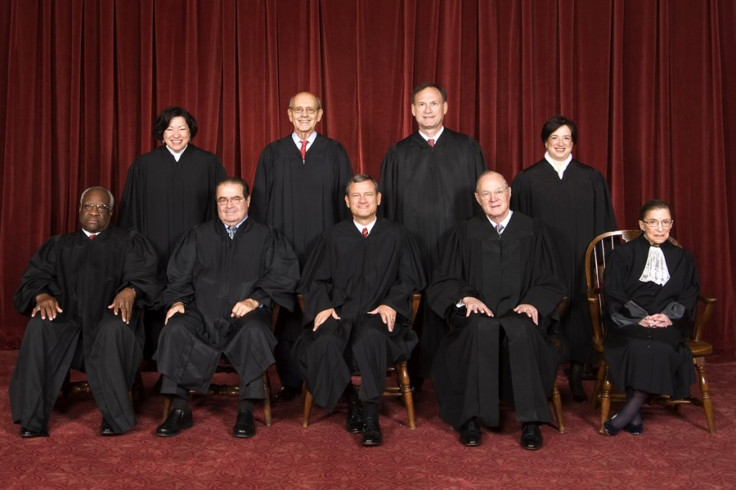Supreme Court Meets To Vote On Health Care Case

The U.S. Supreme Court's ruling on the health care law will be released in June, likely in the final batch of opinions for the year. While Americans wait, the justices Friday cast their initial vote, confidentially: the nine justices gathered in a conference room and made their stance known before setting off to draft their opinions, a process that gives each justice a chance to change their first vote.
There are court watchers and prognosticators who are predicting that a slim 5-4 majority will strike down the law's mandate that almost all Americans carry a basic form of health insurance. However, there are also careful legal/public law experts who are avoiding predicting how the justices will vote: despite three days of testimony that saw the signature legislation of the Obama administration's first term thoroughly critiqued, oral arguments are never a sure-fire guide to the final decision, but rather a way to test the strength of the parties' positions.
Oral arguments are designed to probe the weakest point of a party's argument and give them an opportunity to advocate, by analogy, apply precedent and to basically put their best face on what may be the toughest part of the argument, explained Gregory Pemberton, former chair of the American Bar Association's health law section and an Ice Miller LLP attorney.
With that in mind, the public got a glimpse of the concerns each justice has with the Affordable Care Act, except for Justice Clarence Thomas, who remained silent on the bench, as usual.
But with an ideologically-divided court -- this the first court in a century where the conservative-liberal wings match up with the Republican and Democratic presidents that appointed them -- the fate of the Affordable Care Act is expected to come down to Chief Justice John Roberts and Justice Anthony Kennedy, the latter a perennial swing vote who can decide if the conservative wing or the liberal wing prevails.
Roberts Court's Place In History
For Roberts, a factor that is expected to weigh on his decision-making process: the case puts the Supreme Court's reputation on the line.
A divisive 5-4 vote from the Roberts Court to strike down the mandate will further the view that the high court is a partisan institution that produced decisions like 2000's Bush v. Gore and 2010's Citizens United, much in the way the public sees the New Deal-era Supreme Court during the Roosevelt administration.
It will be the Roberts Court that will be remembered for that, said Tom De Luca, professor of political science at Fordham University, referring to this week's Affordable Care Act case.
Roberts -- who would get first crack at writing the opinion if he is in the majority -- will be forced to balance out two competing interests: the idea that the Supreme Court should not legislate from the bench vs. striking down the possible constitutional violations the individual mandate poses.
During Tuesday's arguments about the insurance mandate, Roberts suggested that a decision upholding the law would give Congress power to regulate in the next unique market in a way similar to health care insurance. A decision to uphold the mandate would mean the court can't say there are limitations on what Congress can do under its commerce power. If that is the case, he said, all bets are off when it came to Congressional authority under the Commerce Clause.
However, Roberts penchant for refusing to tinker with Congress could have been on the mind of the Obama administration's lawyer, Solicitor General Donald Verrilli. In closing remarks, he said, I would encourage this court to respect [Congress' policy] judgment and ask that the Affordable Care Act, in its entirety, be upheld.
If he thinks [the mandate] is a marginal question of whether it's...constitutional violation, the conservative edict of 'Don't be an activist justice' could possibly kick in for him, De Luca said in an interview.
The Swing Vote
Kennedy, too, seemed to have his own balancing act, between the public's place in the health insurance market and the mandate's reach into the lives of Americans.
He articulated a key part of the government's argument when he asked if healthy, young people are an actuarial reality that can and must be measured for health service purposes.
They are in the market and in a sense they are creating a risk that the market must account for, he said.
On the other hand, he also recognized the unprecedented nature of the mandate, saying the provision alters the relationship between the individual and government in a fundamental way. He suggested the Obama administration had a heavy burden of justification for the mandate.
But how Kennedy and Roberts will come down on the Affordable Care Act is anyone's guess, even after six hours of oral arguments.
Orin Kerr, a former Kennedy clerk and law professor, noted, the unanswered question that could determine Kennedy's and Roberts' decision is whether the special economics of the health care market justifies the mandate here.
The logic is so compelling on both sides and it's an awfully close question, said Pemberton, the Ice Miller LLP attorney. We're going to have to stay tuned until June.
--
© Copyright IBTimes 2024. All rights reserved.





















